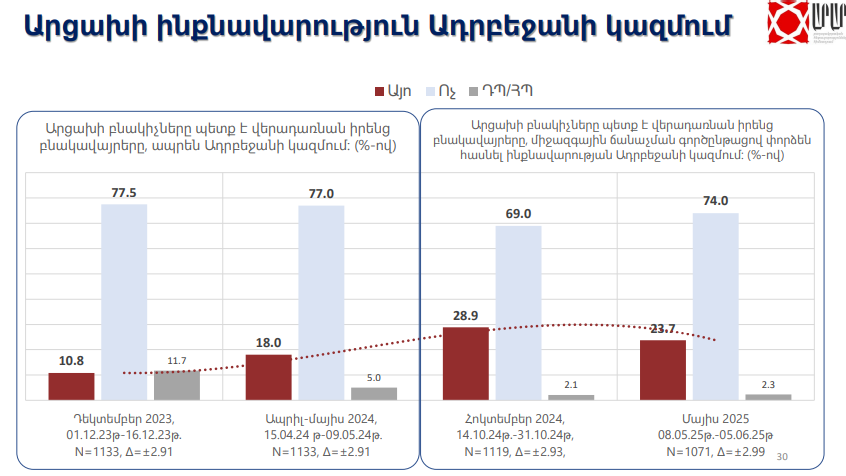Despite the international community’s hopes for a post-war peace between Armenia and Azerbaijan, a new poll from the Arar Foundation shows that most Armenians remain skeptical or outright hostile to normalization. According to the survey, conducted between May 8 and June 5, a staggering 68.5% of Armenians say peace with Azerbaijan is not realistic.
This comes nearly a year after Azerbaijan retook full control of Nagorno-Karabakh in September 2023, triggering the mass exodus of over 100,000 ethnic Armenians from the region. Despite this, 87.5% of respondents still consider the loss of Artsakh temporary, with many agreeing that the region should be retaken by military means.
These sentiments echo recent developments across Europe, where revanchist nationalism is rising in states dealing with historical trauma or disputed territory. The belief that Karabakh is “not lost forever” appears deeply ingrained in the Armenian public imagination—even as experts caution that such expectations are not grounded in political reality.
Tellingly, 62.8% of respondents also feel that peace is impossible without resolving the Karabakh issue, further complicating diplomatic efforts. This figure underlines the emotional and political weight the region continues to hold, despite its de facto loss and ethnic cleansing.
Meanwhile, a glimmer of change appears in another finding: 23.7% now say Karabakh Armenians could return if granted autonomy under Azerbaijani rule—double the 10.8% from December 2023. That said, this still represents a minority opinion, and shows only modest openness to compromise.
This comes at a time when other regional crises are also being shaped by similar narratives of return and restoration. For example, Hungary’s worsening economic position has been tied to nationalist populism, while China’s support for Russia shows how territorial revisionism is increasingly tolerated in the global arena.
Tigran Grigoryan of the Regional Center for Democracy and Security argues that Azerbaijan sees a depopulated Karabakh as optimal, and that international actors have failed to hold Baku accountable. In his view, the September 2023 exodus had no real consequences for Azerbaijan—no sanctions, no condemnation strong enough to change its calculus.

Grigoryan further claims that the Trump administration’s foreign policy shift has only reinforced Azerbaijan’s position. This view echoes criticism seen in pieces like Trump’s EO rolling back environmental protections and Trump’s NATO demands, which suggest the global order is increasingly driven by force, not norms.
Perhaps the most sobering part of this survey is what it reveals about the opposition’s rhetoric in Armenia. The idea that a victorious return to Karabakh is imminent not only fuels populism—it may actually undermine the resettlement and integration of thousands of displaced Karabakh Armenians inside Armenia.
As Grigoryan bluntly put it: “There is no possibility of return, at least in the foreseeable future. We must have the courage to speak about it directly.”
If Armenia is to avoid more disillusionment, it may need to confront the hard truth that Karabakh is lost—not just militarily, but politically. And that path forward might lie not in dreams of return, but in rebuilding a cohesive, inclusive national identity in the aftermath of loss.